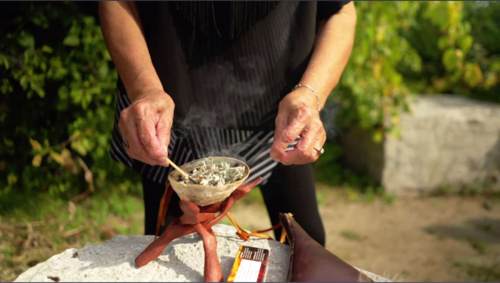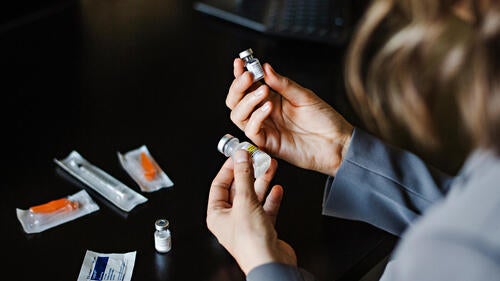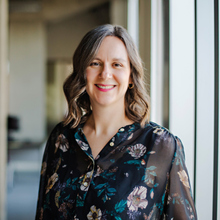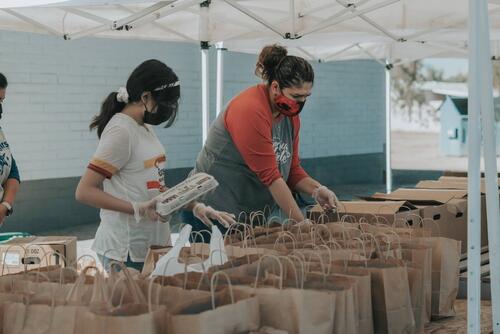The Daily Bulletin is published by Internal and Leadership Communications, part of University Communications
Contact us at bulletin@uwaterloo.ca
Submission guidelines
Editor:
Brandon Sweet
University Communications
bulletin@uwaterloo.ca
A message from Charmaine Dean, Vice-President Research and International.
The widespread transmission of the Omicron variant is straining our health and wellness system across the region and country. In response, the Region of Waterloo is reaching out to our University community with redeployment opportunities to support our frontline workers in local hospitals, long-term care, retirement homes and shelters.
We are writing to you today to consider two mechanisms for your support to our community. These include being temporarily redeployed to work in a hospital or other community setting, and/or volunteering on your own time in the following high-need areas:
Food services — portioning food, rolling cutlery, working in the dish room
Virtual visits with residents at long-term care and retirement facilities
Patient experience assistants — answering call bells to determine patient needs, providing food/refreshments
Staffing the Emergency Child Care Services for essential workers
Commitment to these roles include:
A minimum of 12 hours per week, over a 3-to-5-week period
Full-time and part-time options
Regular salaries paid for those working during regular office hours
Training by the region will also be provided
All staff who request temporary redeployment must receive approval from their supervisors. Those who are deployed will not be replaced during the deployment period. Supervisors must ensure that these staff members can be freed up to volunteer their time during working hours, without detriment to their Unit. The University is negotiating a memorandum of agreement between Waterloo and the Region for staff who are temporarily deployed. Further information on this will be available soon.
Areas that are not permitted for redeployment include roles that are integral to keeping the campus operating safely. These include, but are not limited to, most roles in Plant Operations, Custodial Services, Campus Housing, Food Services and Special Constable Services and some roles in Campus Wellness.
If you would like to hear more about the potential of participating in this opportunity, we invite you to a Q & A session to answer your questions about the duties. We hope this will help you make an informed decision before speaking with your supervisor as to whether temporary redeployment during working hours is possible or whether you have interest in volunteering, on your own time.
To sign-up for the Q & A please register.
It will take all of us coming together to manage our way through this pandemic. Our community needs us, now more than ever, to ensure that we use our collective resources to support our frontline workers.

On January 13, 2022, the Office of Indigenous Relations marked its second anniversary, celebrating two years of impact on campus and beyond. The Indigenous Initiatives Office was renamed as the Indigenous Relations Office under AVP Jean Becker in October 2021. Becker brings over 40 years’ experience in postsecondary Indigenous initiatives.
Since 2020, Waterloo has seen not only an increased need for the work of the Office of Indigenous Relations, but an increased investment in the mandate of Indigenization across campus.
Below is a list of key achievements and actions:
The Office of Indigenous Relations will continue providing events, conferences, workshops, speakers such as the 10 calls to action for natural scientists and Hallman Lecture and Panel: COVID-19 and Indigenous communities.
The Office of Indigenous Relations is continually in advisement and consultation across campus on all topics from addressing student barriers to faculty strategic planning. In addition, they engage with external community members to establish connections and partnerships for the University community on a number of fronts.
Another active area of work is providing support for Indigenous and non-Indigenous researchers through the Office of Research as well as with researchers directly.
Space for the Office of Indigenous Relations is in development, with an anticipated completion date of September 2022. An Indigenous outdoor Gathering Space is also currently in an active design phase.
“I am very happy with the support I have received at Waterloo over the past two years from numerous staff, faculty, students and senior administration to decolonize, Indigenize and respond to the TRC recommendations,” says Jean Becker, Associate Vice-President, Indigenous Relations. “We recognize that there is still much to be done and we are committed to doing the work that will have our University be a leader in reconciliation and decolonization.”
Find out more about the Office of Indigenous Relations.

By Rose Simone. This article was originally published on Waterloo News.
During the global COVID-19 pandemic, digital technology tools helped pharmacies expand their role on the front lines of patient care.
Online vaccination bookings, pharmacy websites that answered frequently asked questions and digital tools that managed the supplies of vaccines and other medications became essential.  Kelly Grindrod, a professor at Waterloo’s School of Pharmacy explains that even though pharmacists have been working for years to be seen as far more than pill counters, the pandemic made them more visible and the general public began to see them in a whole new light.
Kelly Grindrod, a professor at Waterloo’s School of Pharmacy explains that even though pharmacists have been working for years to be seen as far more than pill counters, the pandemic made them more visible and the general public began to see them in a whole new light.
“The pandemic showed us that pharmacists have a much bigger role in health care than the public had realized,” Grindrod says. “When a lot of family doctors had to shut down their practices or medical staff were busy in the hospitals, the pharmacists were there.”
Grindrod’s research focuses on user-testing of technology in health care. She has seen how digital technology has helped make pharmacies more efficient in providing health-care services. Grindrod and her students work in close collaboration with other departments, such as Waterloo’s Faculty of Engineering, to do user testing of new technologies.
One example was a vaccine tracking app built by Ryan Tennant, a PhD student supervised by Professor Catherine Burns of the Systems Design Engineering program at Waterloo. The app helped manage the complicated supply and demand of vaccines in a situation where people sometimes booked vaccine appointments but didn’t show up, while others walked in without an appointment. Vaccine clinics and pharmacies were trying to minimize unused doses at the end of the day to ensure precious vaccines were not wasted. The app was designed to help them do exactly that.
Grindrod’s team helped test the app at two vaccine clinics in Waterloo Region so the developer could then address workflow challenges to improve it.
“That was an example of an invisible solution that the public would never know about, but it was important in a situation where we had vaccines that were like ‘liquid gold.’ It helped minimize waste and that was wonderful,” she says.
Grindrod’s team is also involved in creating vaccine education tools for health-care stakeholders, which could be used to reach global audiences to combat vaccine misinformation.
“You can’t just put information out there,” Grindrod explains. “You need to test it with people that you want to deliver it to, and that’s where our expertise comes in. We get the feedback from a target group, in order to be able to say, ‘Yes, you nailed it’ or ‘no, this doesn't help my decision.’
Prior to the pandemic, Grindrod developed the Pharmacy 5in5 online continuing education program for pharmacists, first testing it with her students and then with alumni and practicing pharmacists. That project originated at the University of Waterloo School of Pharmacy and is now being used nationally to help support busy pharmacists in their ongoing learning.
Grindrod was also the pharmacy lead on the Waterloo Region Vaccine Task Force, helping engage pharmacists and interns in vaccination clinics. As the pandemic wanes, she hopes the pharmacies can become key to helping people catch up on the other vaccinations that have been missed over the last couple years.
Already, the Neighbourhood Pharmacy Association of Canada has asked the Ontario government to expand the role of pharmacies in providing a wider variety of publicly-funded vaccinations, beyond the COVID-19 vaccines and flu shots that people can currently get at pharmacies for free.
The association notes that 95 per cent of Canadians live within five kilometres of a community pharmacy, which means pharmacies could become quick, convenient and efficient vaccination providers. But Grindrod believes pharmacies need better digital tools to help them overcome the logistical hurdles.
“We are entering a new phase, when what we have been building and learning during the pandemic will have to be applied to other areas where we have fallen behind. We have enormous work to do to catch up in critical areas such as disease prevention and screening or chronic disease management,” Grindrod says.
The technology being used in health care today can involve everything from social media to mobile apps and connected networks, as well as technologies such as barcoding and scanning health-care cards right into a computer system.
“What I would have thought digital technology meant five years ago now means so many more things. It’s all about information,” Grindrod says. “But with all different technologies and online platforms, the user testing is important to ensure that these tools work as intended. We want to build great systems that are a lot better.”
Grindrod believes digital technology can also help to connect Canada’s very fragmented health-care system, where each province has its own way of managing health information. Even within one province, there are information “silos” in health care.
“In the ideal health-care scenario, patients would have access to what they need, when they need it, from a team of people who understand those needs,” she says. This extends beyond day-to-day care as well. “For example, if an entire community is uprooted because of a forest fire, that information needs to be accessible no matter where they end up.”
Grindrod says the lessons learned during the pandemic can help us prepare for future challenges and be a springboard to improve health care by making pharmacists across Canada and globally an extension of public health in communities.

The Waterloo Institute for Nanotechnology is hosting a Women in Nanotechnology information seminar on Friday, January 21 at 2:00 p.m. "This outreach event aims to “demystify” STEM and nanotechnology as a course of study and career path for young women, and by extension, other under-represented groups," says a note from the session organizers.
"All students are invited to meet prominent women in nanotechnology to hear about their history, exciting research, and how they chose their successful career paths. This seminar will provide valuable information to all students, particularly female students, who may be interested in graduate work and careers in S&T but do not know what avenues are open to them."

Dr. Hilary Hoynes, Professor of Economics and Public Policy at UC Berkeley, will be presenting the Faculty of Arts Distinguished Lecture in Economics this Friday, January 21 from 3:00 p.m. to 4:30 p.m.
Her lecture, entitled “Suffering, the Safety Net and Disparities during Covid-19”, will highlight essential lessons for policymakers on supporting families and their children through economic crises.
"The COVID-19 crisis produced exceptionally large spikes in unemployment rates in Canada and the United States in the Spring of 2020 with disproportionate impacts on low-income families," says the talk's abstract. "School and child-care centre closures meant lost learning and free- and reduced-price school meals for many low-income children. While governments in both countries responded swiftly with targeted income support aimed at helping displaced workers and their families bridge the crisis, the US also distributed universal support payments and expanded the duration and benefit levels of the unemployment insurance programs."
Visit the Economics website for more details and to register your attendance at this link.
Campus Wellness locations will be closed today from 8:30 a.m. to 11:30 a.m. due to an all-staff meeting.
Superclub: the Ministry of Sound at 30
Students can visit the Student Success Office online for supports including academic development, international student resources, immigration consulting, leadership development, exchange and study abroad, and opportunities to get involved.
Instructors looking for targeted support for developing online components for blended learning courses, transitioning remote to fully online courses, revising current online courses, and more please visit Agile Development | Centre for Extended Learning | University of Waterloo (uwaterloo.ca).
Instructors can visit the Keep Learning website to get support on adapting their teaching and learning plans for an online environment.
Course templates are available within your course in LEARN to help you build and edit your content and assignment pages quickly.
The following workshops, webinars, and events are offered by the KL team (CTE, CEL, ITMS, LIB):
Employees can access resources to help them work remotely, including managing University records and privacy of personal information. Here are some tips for staying healthy while working from home.
Stay informed about COVID cases on campus by consulting the COVID case tracker.
The Writing and Communication Centre has virtual services and programs to help undergrads, grad students, postdocs and faculty members with academic writing.
Co-op students can get help finding a job and find supports to successfully work remotely, develop new skills, access wellness and career information, and contact a co-op or career advisor.
The Centre for Career Action (CCA) is currently offering virtual services only. Questions about CCA's services? Live chat or call 519-888-4047 between 8:30 a.m. and 4:30 p.m. EST, Monday to Friday.
Drop-in to Warrior Virtual Study Halls on Wednesdays from 5:30 p.m. to 7:00 p.m. Come together in this virtual space to set goals and work independently or in groups each week.
Renison's English Language Institute continues to offer virtual events and workshops to help students practice their English language skills.
If you feel overwhelmed or anxious and need to talk to somebody, please contact the University’s Campus Wellness services, either Health Services or Counselling Services. You can also contact the University's Centre for Mental Health Research and Treatment. Good2Talk is a post-secondary student helpline available to all students.
The Library will continue to focus on digital resources and consultations as we start winter term with classes primarily online, though spaces will be open for drop-in individual study space, bookable individual study rooms, drop-in access to computers and printers, book pick-up services and IST Help Desk support. Special Collections & Archives and the Geospatial Centre will be accessible by appointment. Full details on current services and hours are available on the Library’s COVID-19 Update webpage.
The Faculty Association of the University of Waterloo (FAUW) continues to advocate for its members. Check out the FAUW blog for more information.
The University of Waterloo Staff Association (UWSA) continues to advocate for its members. Check out the UWSA blog for more information.
The Sexual Violence Prevention and Response Office (SVPRO) supports all members of the University of Waterloo campus community who have experienced, or been impacted, by sexual violence. This includes all students, staff, faculty and visitors on the main campus, the satellite campuses, and at the affiliated and federated Waterloo Institutes and Colleges. For support, email: svpro@uwaterloo.ca or visit the SVPRO website.
The Office of Indigenous Relations is a central hub that provides guidance, support, and resources to all Indigenous and non-Indigenous campus community members and oversees the University's Indigenization strategy.
The Waterloo Indigenous Student Centre, based at St. Paul’s University College, provides support and resources for Indigenous students, and educational outreach programs for the broader community, including lectures, and events.
WUSA supports for students:
Peer support - MATES, Glow Centre, RAISE, Women’s Centre - Visit https://wusa.ca/peersupport to book an appointment either in person or online for the Fall term.
Food Support Service food hampers are currently available from the Turnkey Desk 24/7 in the Student Life Centre. Drop off locations are also open again in SLC, DC, DP, SCH and all residences.
Co-op Connection all available online. Check https://wusa.ca for more details.
Centre for Academic Policy Support - CAPS is here to assist Waterloo undergraduates throughout their experience in navigating academic policy in the instances of filing petitions, grievances and appeals. Please contact them at caps@wusa.ca. More information is available.
WUSA Student Legal Protection Program - Seeking legal counsel can be intimidating, especially if it’s your first time facing a legal issue. The legal assistance helpline provides quick access to legal advice in any area of law, including criminal. Just call 1-833-202-4571.
Empower Me is a confidential mental health and wellness service that connects students with qualified counsellors 24/7. They can be reached at 1-833-628-5589.
GSA-UW supports for graduate students:
The Graduate Student Association (GSA-UW) supports students’ academic and social experience and promotes their well-being.
Advising and Support - The GSA advises graduate students experiencing challenges and can help with navigating university policies & filing a grievance, appeal, or petition.
Mental Health covered by the Health Plan - The GSA Health Plan now has an 80 per cent coverage rate (up to $800/year) for Mental Health Practitioners. Your plan includes coverage for psychologists, registered social workers, psychotherapists, and clinical counsellors.
Dental Care - The GSA Dental Plan covers 60 per cent to 70 per cent of your dental costs and by visiting dental professionals who are members of the Studentcare Networks, you can receive an additional 20 per cent to 30 per cent coverage.
Student Legal Protection Program - Your GSA fees give you access to unlimited legal advice, accessible via a toll-free helpline: +1-833-202-4571. This advice covers topics including housing disputes, employment disputes, and disputes with an academic institution.
The Graduate House: Open Monday to Friday 11:30 a.m. - 6:00 p.m. The Graduate House is an essential component of graduate student life, and we're working hard to make it available to students. The quality food with local ingredients you love is available for takeaway. And graduate students who paid their fees can still get discounts and free coffee.
BIPOC Student Collective - The Collective is a safe space for BIPOC LGBTQ2+ students and aims to foster intergenerational and peer-to-peer support and mentorship. Join the online Discord channel for solidary chats and drop-in sessions.
Warriors vs. Laurier Blood Donation Battle. Join our “Waterloo Warriors” team on the Blood.ca website or app. #ItsInYouToGive
Healthy Warriors at Home, free online programs including Nutrition Guides, Personal Training Consults, Health Webinars, Mindfulness Courses and On-demand Fitness. Sign up now.
Warrior Rec Live Fitness Classes, free classes Monday to Thursday with a valid Warrior Rec membership. Barre, Yoga, Zumba, Warrior Workout, Boxing and more. Register now.
Quantum Nano Collision Seminar Series: Professor Kevin Musselman, Wednesday, January 19, 4:00 p.m. to 5:00 p.m.
CrySP Speaker Series on Privacy featuring Sarah Lamdan, CUNY School of Law, “Data Analytics Companies in Academia,” Wednesday, January 19, 1:30 p.m., on Zoom.
WaterTalk: Harnessing 'Omics to Inform Strategies to Mitigate the Spread of Antimicrobial Resistance as a One Water Challenge, presented by Amy Pruden, Thursday, January 20, 10:30 a.m.
GreenHouse Transportation Hack for Health, Friday, January 21 to Saturday, January 22, Virtual Event and Pitch Competition, details and registration information can be found on the event page.
SWORDC seminar, "Child & youth mental health need, service use & resource allocation: Analyses using 2014 Ontario Child Health Study data linkages" by Dr. Laura Duncan, Professor of Psychiatry and Behavioural Neurosciences, McMaster University," Friday, January 21, 1:00 p.m.
NEW - Waterloo Institute for Nanotechnology Women in Nanotechnology seminar, Friday, January 21, 2:00 p.m. to 4:00 p.m.
NEW - Faculty of Arts Distinguished Lecture in Economics, “Suffering, the Safety Net and Disparities during Covid-19,” Friday, January 21, 3:00 p.m. to 4:30 p.m.
WaterLeadership: Media 101 - Tips for Engaging with the Media, presented by Pamela Smyth. Tuesday, January 25, 1:00 p.m.
GEDI Exchange Webinar - A 30 Minute Exchange with GeoMate and Lim Geomatics: Tuesday, January 25, 1:00 p.m. Join this discussion with GeoMate and Lim Geomatics as they look “Beyond GPS: Leveraging geospatial data to transform how we live and work”. More info and registration here: https://uwaterloo.ca/gedi-exchange/30-minute-exchange
The Daily Bulletin is published by Internal and Leadership Communications, part of University Communications
Contact us at bulletin@uwaterloo.ca
Submission guidelines
The University of Waterloo acknowledges that much of our work takes place on the traditional territory of the Neutral, Anishinaabeg, and Haudenosaunee peoples. Our main campus is situated on the Haldimand Tract, the land granted to the Six Nations that includes six miles on each side of the Grand River. Our active work toward reconciliation takes place across our campuses through research, learning, teaching, and community building, and is co-ordinated within the Office of Indigenous Relations.